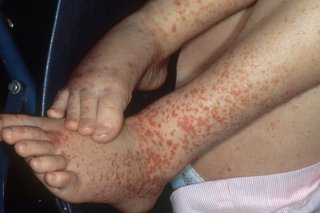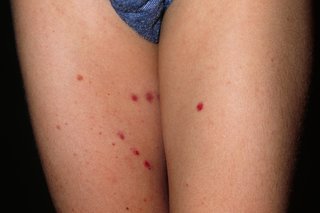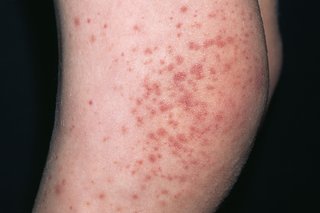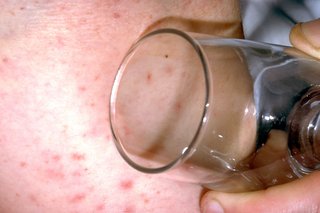Henoch-Schönlein purpura (HSP) affects the blood vessels and causes a spotty rash. It's not usually serious, but can sometimes lead to kidney problems.
Check if you or your child has HSP
The main symptom of HSP is a rash of raised red or purple spots. The spots look like small bruises or blood spots.

John Watney/SCIENCE PHOTO LIBRARY

DR P. MARAZZI/SCIENCE PHOTO LIBRARY

DR P. MARAZZI/SCIENCE PHOTO LIBRARY
Urgent advice: Get advice from 111 now if:
- you or your child have a rash that does not fade when a glass is pressed against it (glass test) but you do not feel unwell
This could be HSP.
111 will tell you what to do. They can arrange a phone call from a nurse or doctor if you need one.
Go to 111.nhs.uk or call 111.
Other ways to get help
Immediate action required: Call 999 or go to A&E if:
- a rash doesn't fade when a glass is pressed against it and you feel very unwell – for example, it's painful to look at bright lights or you have a stiff neck
This could be something serious like meningitis.
See what a rash that doesn't fade looks like
Important
How to do the glass test
- Press the side of a clear glass firmly against the skin.
- Check a few times to see if you can still see the spots through the glass.
The rash can be hard to see on dark skin. Check paler areas like the palms of the hands and the soles of the feet.
What happens if you have HSP
There's no treatment for HSP. It usually passes in a few weeks and you can normally just rest at home until you feel better.
HSP can't spread to others, so:
- your child can return to school or nursery when they feel well enough
- you can go back to work as soon as you feel up to it
Treatment to relieve your symptoms
Paracetamol can help ease any pain.
Don't take ibuprofen without speaking to your doctor because it could harm your kidneys.
Regular check-ups for kidney problems
You'll have regular check-ups for 6 to 12 months to check how well your kidneys are working.
You'll usually be asked to provide a sample of pee and have your blood pressure checked at each appointment. This may be done at home, at your GP surgery, or in hospital.
Treatment in hospital
You may need to go into hospital if HSP affects your kidneys.
In hospital, you may be given strong medicines like steroids to help ease your symptoms.
Long-lasting effects of HSP
Most people with HSP make a full recovery. Any kidney problems usually get better without treatment.
But sometimes HSP can be severe and last several months, particularly in adults.
There's also a small chance the kidneys could be permanently damaged (chronic kidney disease). This is why it's important to have regular check-ups.
Important
You can get HSP more than once. Get medical advice quickly if the symptoms come back.
Page last reviewed: 25 September 2017
Next review due: 25 September 2020

